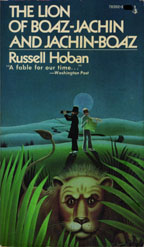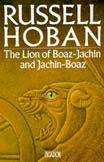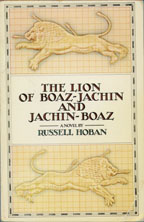 The Pocket Books Edition I grew up with...discovered on a museum's used book table when I was in junior high. The pages had those red edges books from the early '70s often had...remember those? |
The Lion of Boaz-Jachin and Jachin-Boaz (1973)
A Novel by Russell Hoban
EDITIONS I KNOW OF:
- (UK) Hardcover - (First Edition) Jonathan Cape, Ltd., 1973.
- (US) Hardcover - (First Edition) Stein and Day, 1973.
- (UK) Trade Paperback - Picador (Pan Books), 1974 (John Hurford hand-drawn lion cover). 192 pp.
- (US) Paperback - Pocket Books (A Division of Simon & Schuster, Inc.), 1974. 192 pp.
- (US) Trade Paperback - Summit Books (Simon & Schuster). Sometime in the early-to-mid 80s. 192 pp.
- (UK) Trade Paperback - Picador (Pan Books), 1991 (George Underwood "lion relief" cover). 192 pp.
- (UK) Trade Paperback - Bloomsbury, 2001. 184 pp.
AVAILABILITY
The Lion... is available in the US as part of the Russell Hoban Omnibus, and Bloomsbury's 2001 trade paperback edition is available in the UK (and to the rest of the world via the Amazon UK Web site). Some used copies are generally available on the Bibliofind site. This book is also relatively easy to find on used bookstore shelves, and in libraries.
DESCRIPTION:
The first unquestionably-for-adults novel Russell Hoban published, and the first Russell Hoban book I ever read (at about age twelve!), The Lion is a masterpiece by any standard. It's set in a time when there are no more lions: lions are extinct, almost legendary, like dragons or unicorns. Jachin-Boaz lives in an unspecified town in the Near East, where he owns a shop that sells all kinds of maps; maps to find water, love, money, whatever the heart desires. He tells his son, Boaz-Jachin, that he's making him a master-map that will be given to him when he is a man; a map that will contain all the secrets of the other maps combined, so that he will be able to find whatever he decides to look for, thus assuring him of a proper start in life. Jachin-Boaz shows his son the map and asks him what he would like to find. 'A lion,' says Boaz-Jachin. 'A lion,' says Jachin-Boaz. 'I don't think I understand you. I don't think you're being serious with me. You know very well there are no lions now.'Cut to scene two, in which Jachin-Boaz, the father, in the throes of existential despair and mid-life crisis, quietly leaves home, taking the master-map and half the family's savings, and leaving behind a note which reads 'I have gone to look for a lion.' Boaz-Jachin is left alone with his embittered mother to run the map shop and wonder where his father has gone with the map that was supposed to be his inheritance.
In the desert not far from the town where Boaz-Jachin lives, there is a palace where the last king is entombed, and his lion hunt is carved in stone on the walls of the great hall. Boaz-Jachin, who has decided to track his father down and ask for his map, takes the bus to the palace where he makes a powerful connection with the image of the dying lion carved in stone. Through a simple but artistic act of sympathetic magic, Boaz-Jachin removes the spears from the throat of the wounded beast and sets its spirit free, then sets off on a cross-country journey to find his father. Meanwhile, Jachin-Boaz, who has established himself in a "great city" in another country, is working in a bookshop, living with a beautiful young woman named Gretel, and dreaming furtive, guilty dreams of the family he abandoned. It's about this time that he turns around one morning on his way to work, and finds himself face-to-face with a very live, powerful and dangerous lion--a lion that he, Gretel, and the son journeying to find him must face, understand and ultimately embrace if they are to find their way out of the uncharted territories of fear, guilt and alienation in which they've gotten lost.
NOTES:
- In Qabalah, Jachin and Boaz are the names of the pillars of Mercy and Severity, respectively; they also turn up in Key 2 of the Tarot, The High Priestess. You can see them clearly in the Waite deck; the High Priestess sits on a throne and to either side are the two pillars. On the viewer's left is the black pillar of Severity, with a large "B" for Boaz; on the right is the white pillar of Mercy inscribed "J" for Jachin. Boaz is also the name of a figure in the bible, in the book of Ruth. I'm not positive how all this bears on the book, except to say that Mr. Hoban has certainly chosen names that are loaded with symbolic significance for his characters.
- The Lion of Boaz-Jachin and Jachin-Boaz seems to contain a certain amount of autobiographical inspiration (not too surprising for a first novel, or for that matter a second or third, you're probably thinking). Jachin's journey to the great foreign capital echoes Mr. Hoban's move to London a few years before the book was published. The young woman he meets there is named Gretel; Mr. Hoban married a woman named Gundula, or "Gundel." Jachin mentions that his father directed plays, as did Mr. Hoban's own father.
Here's what Mr. Hoban had to say in a 1992 talk at San Diego State University:
"[In 1969] I organized everything for a trip to London for a two-year stay. It took about a year to get everything organized, to find schools for our four kids and to put the dog in quarantine and to give the pony away and the cat and sell two cars. I got all that organized and got an idea for a sequel to The Mouse and His Child called The Return of Manny Rat. I got about seventy-nine pages into that, came to London and was there for a while, and I had a mid-life crisis. When the dust cleared, my wife and kids were back in the States and I was still in London.
The Picador cover featuring
George Underwood's illustration
of the lion hunt relief"I looked at some notes I had about this lion, which I had seen a photo of in a book of Mesopotamian art. [Points to enlargement on chalkboard.] This is from a sandstone relief of the lion hunt from the northern palace of King Ashurbanipal of Nineveh. The lion is gripping the wheel of the king's chariot. This is his fiercely frowning face as the wheel brings him up; he is gripping the wheels of the king's chariot with his claws as the wheels bring him up to the spears of the king and the king's huntsmen, so he's dying in the act of fighting, of attacking the wheels of the king's chariot.
"This lion got a pretty good grip on me and I swatted up Mesopotamia and Mesopotamian mythology and Sumerian mythology and interpolated some of my own into it and developed a background from which I expected my lion to come into some kind of story. I was hoping maybe for a super short story. I accumulated notes, but nothing happened. That was before I went to London. Then when I got there in 1970, living alone, I picked up the pages. All of the four children of my first marriage were angry at me, and I thought about the anger. The story came to me with just one child. The father leaves the son at home to be the old man while the father tries to be the son going out into the world to become a man."
- Readers of Mr. Hoban's 2001 children's storybook Jim's Lion might suspect that the lion in that book has more than a nodding acquaintance with the lion in this one...
 The Summit Books trade edition |
REVIEW QUOTES:
"A piece of invention as original as any of Tokien's or C. S. Lewis'."--New Statesman
"One of those absolutely unclassifiable beauties that come along every so often, just as you've about given up hope of ever again finding a new book with a human voice behind it and a way of looking at the world that hasn't been predigested and pre-read...I wish I'd written it. It's one of a kind, and those are the only sort of books that mean anything to me."
--Peter S. Beagle, author of The Last Unicorn
"Mr. Hoban is unclassifiable, thank goodness. His narrative is so minutely and compellingly realistic that after a time you cease to notice that he has stood reality on its head."
--The Sunday Times (London)
"First novels of outstanding quality are so rare that they call for a certain amount of celebration. One's enjoyment of the novel derives from Mr. Hoban's unusually vivid imagination, his immensely striking use of words to describe the being-with-the-lion feeling in a world where there are no lions. And, finally, most welcome of all, his use of these powerful images in conjunction with a sense of the ridiculous which verges on the total."
--Auberon Waugh, The Spectator
MEMORABLE LINES AND PASSAGES:
Back to The Head of Orpheus: a Russell Hoban Reference Page (home page).
Russell Hoban's other novels and collections: